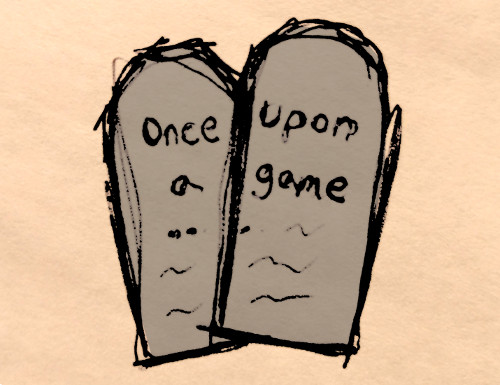As someone who enjoys older games a story campaign is often critical since multiplayer communities have typically already moved on. Yet it’s hard to overlook some advances in game usability when going back to the past. Now technically these commandments are meant to address campaigns, whether solo or co-op. Still, whether making a new game or remastering an old one, designers please consider these guidelines to avoid frustrating your players.
I. Thou shalt not require Internet
An Internet connection requirement for a campaign is the bane of traveling and rural players who may not have the access or bandwidth to enjoy your game. Neglecting local-network and couch co-op is similarly frustrating for these gamers.
II. Thou shalt always allow pause and skip
Being able to pause at all times is important to gamers with families and responsibilities that may interrupt play. Similarly being able to skip cut-scenes or non-core gameplay helps avoid frustration. Otherwise one may feel forced to miss critical scenes or re-experience the same thing over and over. Ideally players can even rewind, replay, and fast-forward non-interactive cut-scenes.
III. Thou shalt auto-save frequently
Automatically saving at milestones is one helpful feature of many modern games. More frequently is better, though only when there is more than one auto-save slot. If nothing else then auto-saving when a player exits—even during a cut-scene—is better than burdening players with the fear-of-missing-out.
IV. Thou shalt quick save and load anywhere
Providing easy and customizable access to a quick save and quick load is even better than auto-save. It functions as a kind of permanent pause and resume helping players feel they are in control of the experience. This too should include saving and reloading in the midst of a cut-scene.
V. Thou shalt allow changing difficulty at any time
Easier difficulty modes are essential for busy and novice gamers, yet without the ability to change the difficulty players can be trapped hours into a path ultimately too boring or frustrating for them. If resources allow then the option to automatically nerf or buff the difficulty is best, so long as the player can override this in case they find dynamic difficulty doesn’t suit them.
VI. Thou shalt provide navigation hints
Whether arrows, way-points, hot-spot indicators, or objective menus there must always be guides for players who so desire. Of course these may be reduced or completely removed when players want a greater challenge.
Please take care not to rationalize transgressing these commandments as ‘essential’ features of your game. As a designer the intended experience should be a goal—not an unmovable absolute. Also keep in mind that neglecting accessibility and usability reduces the audience capable of appreciating your games.
Did I miss a commandment? Is there one that doesn’t belong? Comments are always appreciated.
